
 The Circular and Biobased Economy is evolving, and you can read how making sustainable products is becoming the new norm according to the Commission’s latest proposal.
The Circular and Biobased Economy is evolving, and you can read how making sustainable products is becoming the new norm according to the Commission’s latest proposal.
In this issue, we host Mrs Evgenia Vogiatzidaki from Draxis who is giving us an update on the progress the pilots are making. As our Advisory Board is growing, we proudly present our newest members. The WaysTUP! circular presents the latest project news whilst Stats for chats takes a trip around the world to capture waste generation. Lastly don’t miss out on the forthcoming events we have selected for your benefit.
The Circular Economy Action Plan requires that almost all physical goods on the EU market are made more friendly to the environment, circular, and energy efficient throughout their whole lifecycle from the design phase through to daily use, repurposing and end-of-life. In accordance with the Action Plan the Commission recently presented a package of proposals to make sustainable products the norm in the EU.
The Commission’s proposal for a Regulation in Ecodesign for Sustainable Products sets new requirements for products. Product design should be more durable, reliable, reusable, upgradable, reparable, easier to maintain, refurbish and recycle, and energy and resource efficient. In order for consumers to have a good understanding of product environmental impacts, product-specific information should be available and Digital Product Passports are introduced for regulated products along with labelling.
This proposal goes beyond the existing framework for eco-design covering a broader range of products are requirements. Products should as such be circular and of a reduced environmental and climate footprint. The proposal also builds on the existing Eco-design rules that have resulted in significant EU energy savings and cost savings for consumers. In 2021 it was estimated consumer savings reached €120 billion and led to a 10% decrease in product energy consumption.
Measures to end the destruction of unsold consumer goods, expand green public procurement and provide incentives for sustainable products are also included in this Communication. The commission has also adopted the Eco-design and Energy Labelling Working Plan 2022-2024 as a transitionary measure.
To support the deployment of sustainable products across the EU market, targeted sectoral initiatives along with the Eco-design proposal the commission also presented the new EU Strategy for Sustainable and Circular Textiles and the revision of the Construction Products Regulation. Additionally, to these priority and high impact sectors a proposal for construction products to fit the built environment to the sustainability and climate objectives was also presented, along with a package of proposed new rules to empower consumers in the green transition.
The Commission is anticipated to publish Part 2 of the Circular Economy Package in July. It is expected to cover a new proposal on environmental and green claims, as well as a policy framework for bio-based plastics, and a review of the Packaging and Packaging Waste Directive.
Access the publication here.

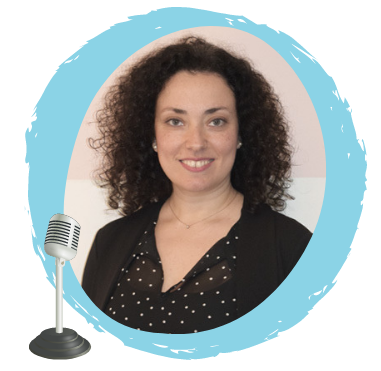
In WaysTUP! we have a dedicated task for monitoring the progress of the seven Pilots and this is important in order to ensure the smooth progress of their activities. DRAXIS, who is responsible for this task, communicates regularly with all Pilots in order to discuss their progress as well as any complications or delays that occur. Until now all Pilots are progressing well. More specifically all Pilots are fully operational while 6 out of 7 pilots have produced the first amount of end-product. For example, until now more than 100kg of biochar (Pilot 7-TUC) as well as more than 150kg of coffee oil (Pilot 2-Bio-bean) have been produced. Moreover, all Pilots are in the process of improving and optimizing their treatment processes so as to increase their yield and meet the desired requirements of their products.
Two main categories of bottlenecks were recognized until now, and in particular those relevant to the feedstock and those related to the applied process. An important challenge faced by some Pilots was the unavailability of the feedstock or the limited amounts of feedstock in order to run properly their processes. In order to overcome this, the Pilots had to look for other providers or in other cases for alternative similar feedstock. Furthermore, the homogeneity of the biowaste was very important for a successful production process. Such an example was the presence of undesirable materials mixed with the biowaste or the unsuitable form of the feedstock, e.g. big pieces of biowaste, bones, wooden sticks, which stressed the mechanical equipment and hindered the treatment process. However, it should be noted that in cases of larger scale plants the latter may not cause significant problems.
It was quite evident that the quality of biowaste is essential for all Pilots in order to increase the efficiency of the valorization processes. Moreover, the presence of undesirable materials (e.g. metal capsules, plastics) or unsuitable physicochemical characteristics (e.g. viscosity, mold) may significantly affect the production processes and as a consequence adjustment to the processes or the equipment may be required. Finally, a pre-treatment phase of the feedstock may be required in some processes in order to improve their efficiency, as well the quality of the end product.

Our Advisory Board is growing…
The project’s External Expert Advisory Board has welcomed two additional members. The new experts will enrich our multidisciplinary team of specialists in biowaste and circular economy with new disciplines of expertise in sustainability assessment and organic synthesis.
The WaysTUP! project team met online with Dr Kamal Azrague and Professor Salvador Gil Grau on the 2nd of March. Over this productive meeting, project partners gained significant insights.
We are pleased to introduce to you the new Advisory Board members and proudly welcome them to the WaysTUP! project!
 Dr Kamal Azrague
Dr Kamal AzragueDr. Azrague is a Senior Researcher at SINTEF. He holds an M.Sc. (2002) and a PhD (2005) in Chemistry from the University Paul Sabatier, France. He has been working with SINTEF since 2009, both in scientific and management positions. His expertise covers a wide range of activities related to environmental issues including water and wastewater treatment, waste management and sustainability assessment with the use of Life Cycle Assessment (LCA) and Life Cycle Costing (LCC). Azrague has participated in several EU projects with a focus on circular economy and bio-economy. He is key personnel in the Norwegian Research-Based Innovation Center (SFI) Klima 2050 and is also leading the working group Nature Based Solutions at Water Europe.
 Professor Salvador Gil Grau
Professor Salvador Gil GrauDr. Gil is a University of Valencia professor in the organic chemistry department and a member of the Interuniversity (UPV-UV) research institute on molecular recognition and technological development (IDM). His Ph.D. thesis was on the synthesis of Xanthones and his post-doctoral one on Enantioselective additions on allyl-silanes. He has worked in Dr. Ramon Mestres’ group to study the reactivity of carboxylic acid dianions and co-authored with him the book Química Orgànica General. He also contributed to Dr. Miranda’s research on photoinduced damage to DNA bases. After joining Dr. Ana M. Costero’s group of supramolecular chemistry, he developed chemosensors for cations, anions, biomolecules and hazardous gases. More recently, with Dr. Ramón Martínez CIBER-bbn group, he contributed to the development of hybrid materials for the detection and controlled release of substances.

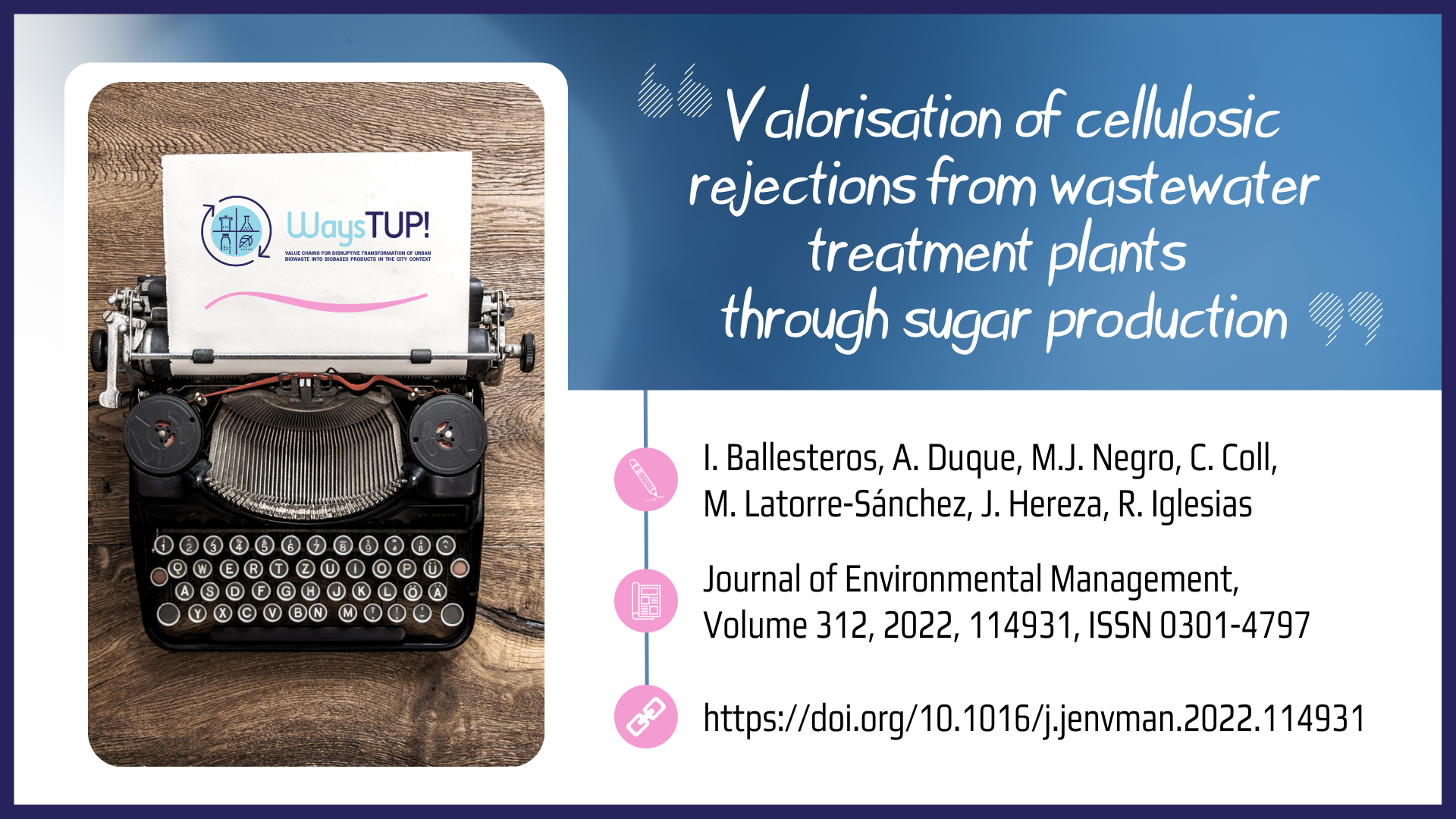 New WaysTUP! publication
New WaysTUP! publicationThe Journal of Environmental Management has included in its latest issue a WaysTUP! publication on the Valorisation of cellulosic rejections from wastewater treatment plants through sugar production. In this study, cellulosic rejections recovered from a wastewater treatment plant in Barcelona (Spain) were characterised and treated using hydrothermal and enzymatic methods to obtain free sugars. These sugars can subsequently be transformed into biofuels or bioproducts within a biorefinery approach. Access the publication here.
 WaysTUP! in the “Our Waste, Our Resources” conference
WaysTUP! in the “Our Waste, Our Resources” conferenceProject partner DRAXIS SA presented the WaysTUP! project in the “Our Waste, Our Resources” virtual conference, organised by the UK Department for International Trade on the 30th of March. The presentation was in relation to “Collaboration across Europe: WaysTUP! project”. This conference brought together cities, consultants and sustainability NGOs to discuss barriers and solutions for waste transformation, and companies offering cutting-edge technology solutions to help with unlocking this value. Read more.
 HSPN takes WaysTUP! at the 4th Verde.Tec
HSPN takes WaysTUP! at the 4th Verde.TecThe HELLENIC SOCIETY FOR THE PROTECTION OF NATURE (HSPN) participated in the 4th international exhibition Verde.Tec on March 18-20. HSPN presented the WaysTUP! project and welcomed at least 500 visitors at its kiosk. Verde.Tec is one of the biggest and high impact environmental events in Greece attracting more than 5000 visitors each year. Read more.
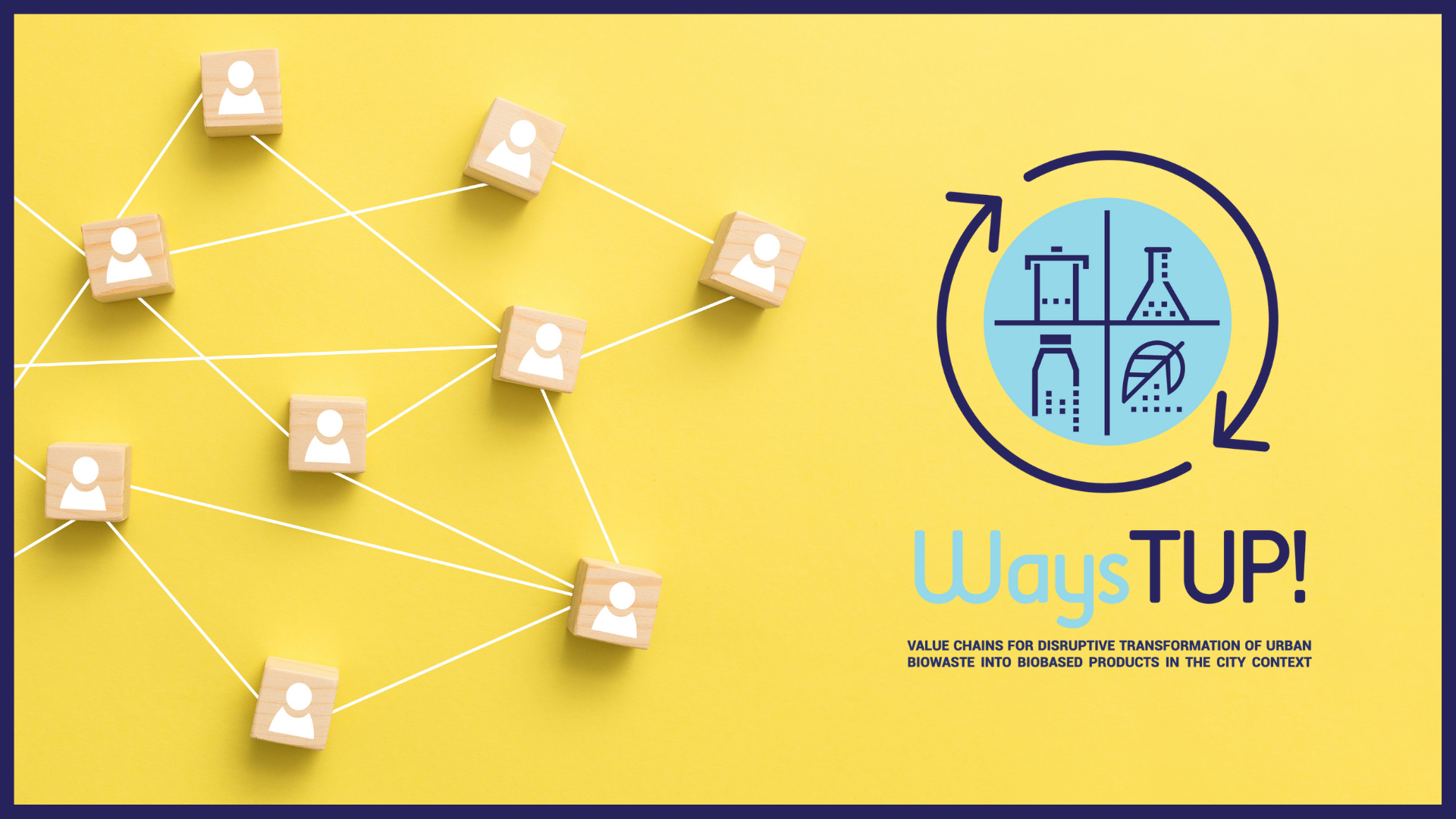 SUSTAINABLE CITY is making WayTUP! known
SUSTAINABLE CITY is making WayTUP! known SUSTAINABLE CITY presented the WaysTUP! project in the following events: (i) The webinar “Optimal biowaste management at a local level” in the context of WaysTUP! on 9/12/2021, (ii) SUSTAINABLE CITY’s Annual Conference on 16/12/2021 with a dedicated panel on “Circular Economy – Effective Waste Management and the WaysTUP! project!”, (iii) The online Conference “Europe Green Deal: Challenges in Employment and Entrepreneurship” coorganised by SUSTAINABLE CITY and EUROPE DIRECT Peloponnese on 10/01/2022. Read more.
 WaysTUP! presentation in the course “Industry 4.0 & Smart Cities” of NTUA
WaysTUP! presentation in the course “Industry 4.0 & Smart Cities” of NTUAOn the 23rd of November 2021, the General Manager of the SUSTAINABLE CITY, Mr. Georgizas Ioannis, presented the WaysTUP! project in the course “Industry 4.0 & Smart Cities” (MBA Techno-Economics) of the National Technical University of Athens. The presentation was part of a seminar course to the audience of MBA students, which consists of experienced executives from the private and public sector. Read more.
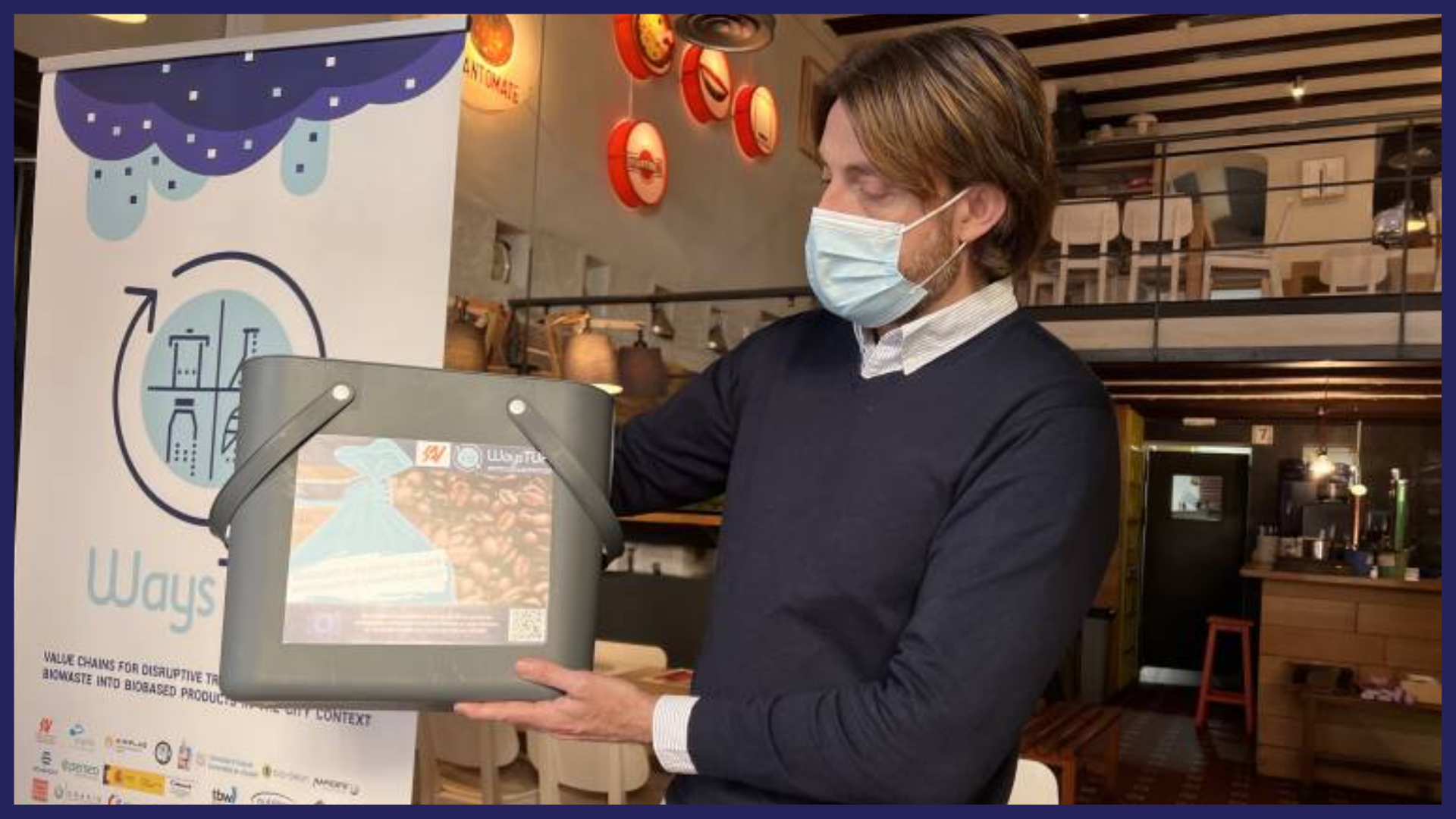 WaysTUP! Join the loop campaign kick offs strong in Valencia
WaysTUP! Join the loop campaign kick offs strong in ValenciaThe Spend Coffee Grounds (SCG) collection program has been launched in different restaurants in the city of Valencia and its metropolitan area coordinated by SAV. The collection of spend coffee grounds is possible thanks to the collaboration of “Grupo Vicios” which in each of its restaurants has placed a WaysTUP! collection containers. SAV will collect SCG door to door for further processing at its plant in L’Alcudia to convert them into preservatives and natural colorants. Next steps include the active participation of citizens in the selective collection of urban organic waste. Alejandro Ramón Álvarez, Councilor Delegate for Climate Emergency and Energy Transition acknowledged the collaboration of the “Grupo Vicios” restaurants, for the separate collection of SCG a circular initiative that strongly contributes to the fight against climate change. Read more.

Waste generation is increasing at an alarming rate around the world, and it has been estimated that by 2050, worldwide municipal solid waste generation will increase by 70% reaching up to 3.4 billion metric tons.
The need for immediate action from municipal authorities is immense as currently less than 20% waste is recycled each year, whilst the remaining quantities are sent to landfill sites. Although significant progress has been made over the last decades on waste management, it is estimated that at least 33% that is not managed in an environmentally safe manner.
Current trends in waste management and a future projection of waste generation are presented in the tables that follow.
SOURCE: THE WORLD BANK IBRD – IDA

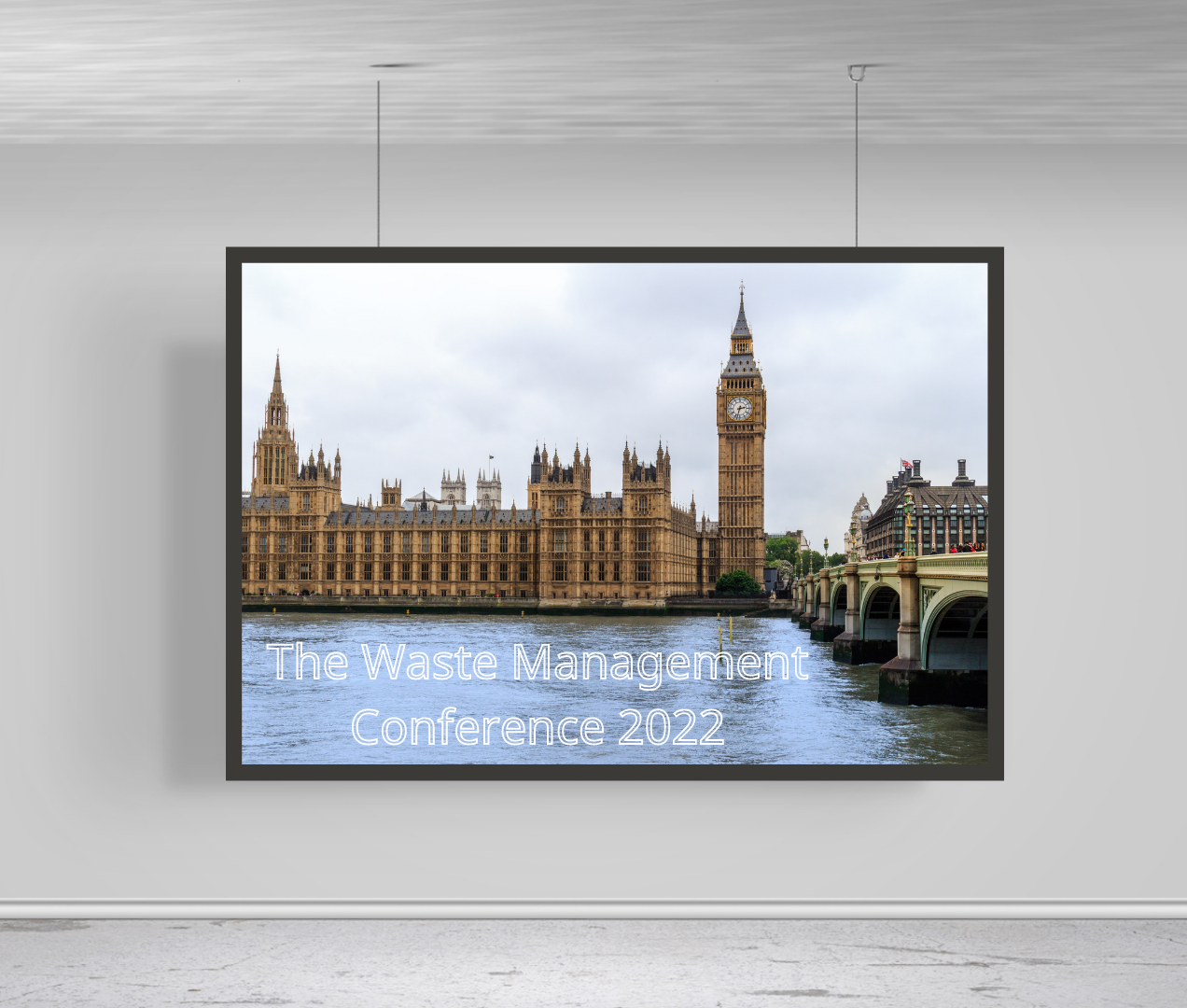
The Rethinking Materials summit: Turning the Tide on Plastic Pollution
4-5 May 2022, London – UK
The Rethinking Materials summit presents new opportunities for partnerships and investment in the changing landscape of plastics, bio-based alternatives, and circular solutions. With an emphasis on packaging and performance materials, this year’s event provides pivotal insights into the challenges of plastic waste. ![]()

The Renewable Materials Conference
10-12 May 2022, Cologne – GERMANY
Ready-to-use fossil-free sustainable material solutions with a low carbon footprint are in fast-growing demand. Innovative brand owners are keeping an eye out for such solutions, in particular those that will soon reach the mainstream. The Renewable Materials Conference will present all renewable material solutions at one event. ![]()
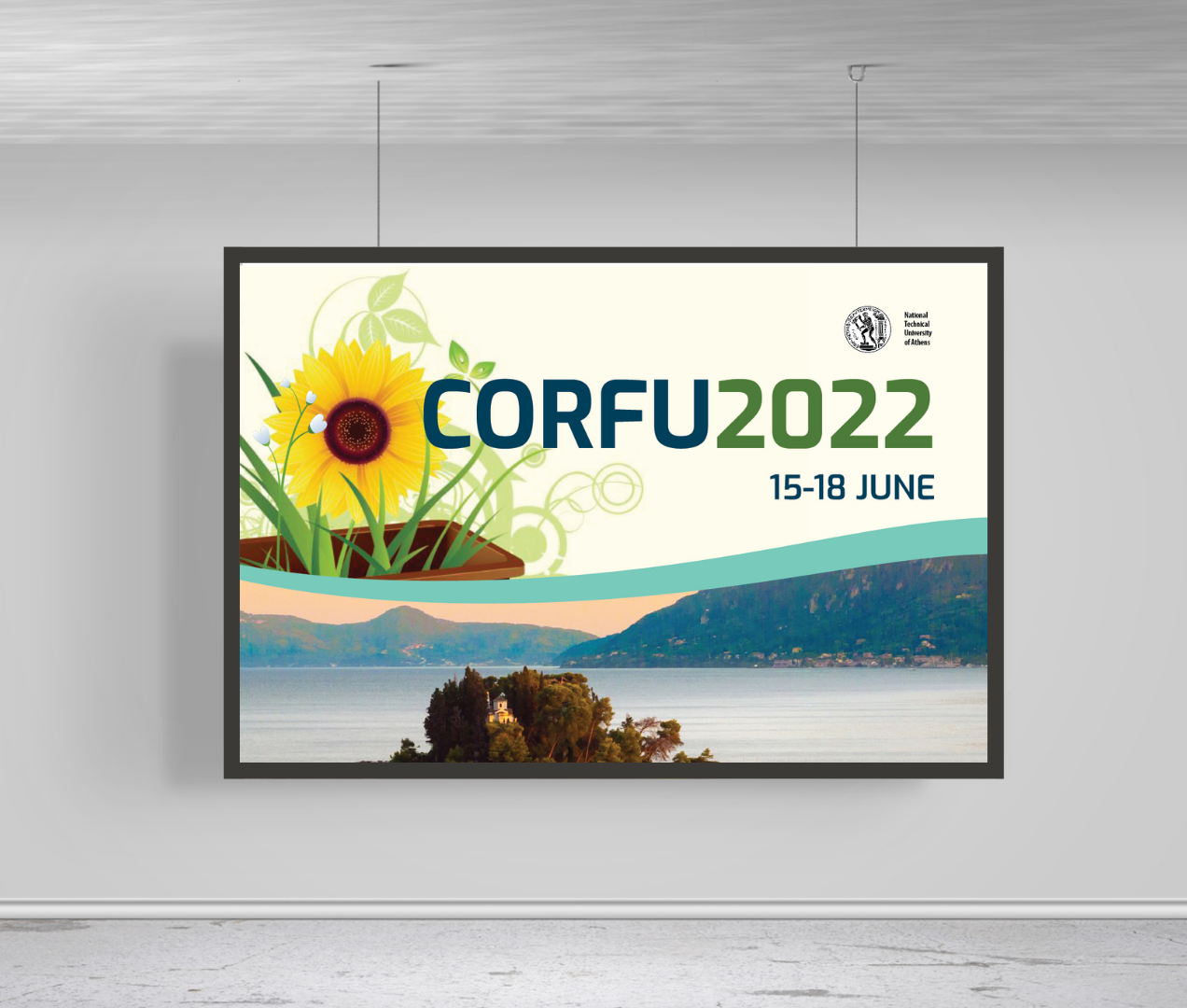
CORFU 2022 9th International Conference on Sustainable Solid Waste Management
15-18 June 2022, Corfu – GREECE
The Conference aims to address the significant issue of sustainable solid waste management through the promotion of safe practices & effective technologies. Special attention will be drawn to the valorization prospects and the products from solid waste, such as: biofuels, compost, materials, etc. ![]()
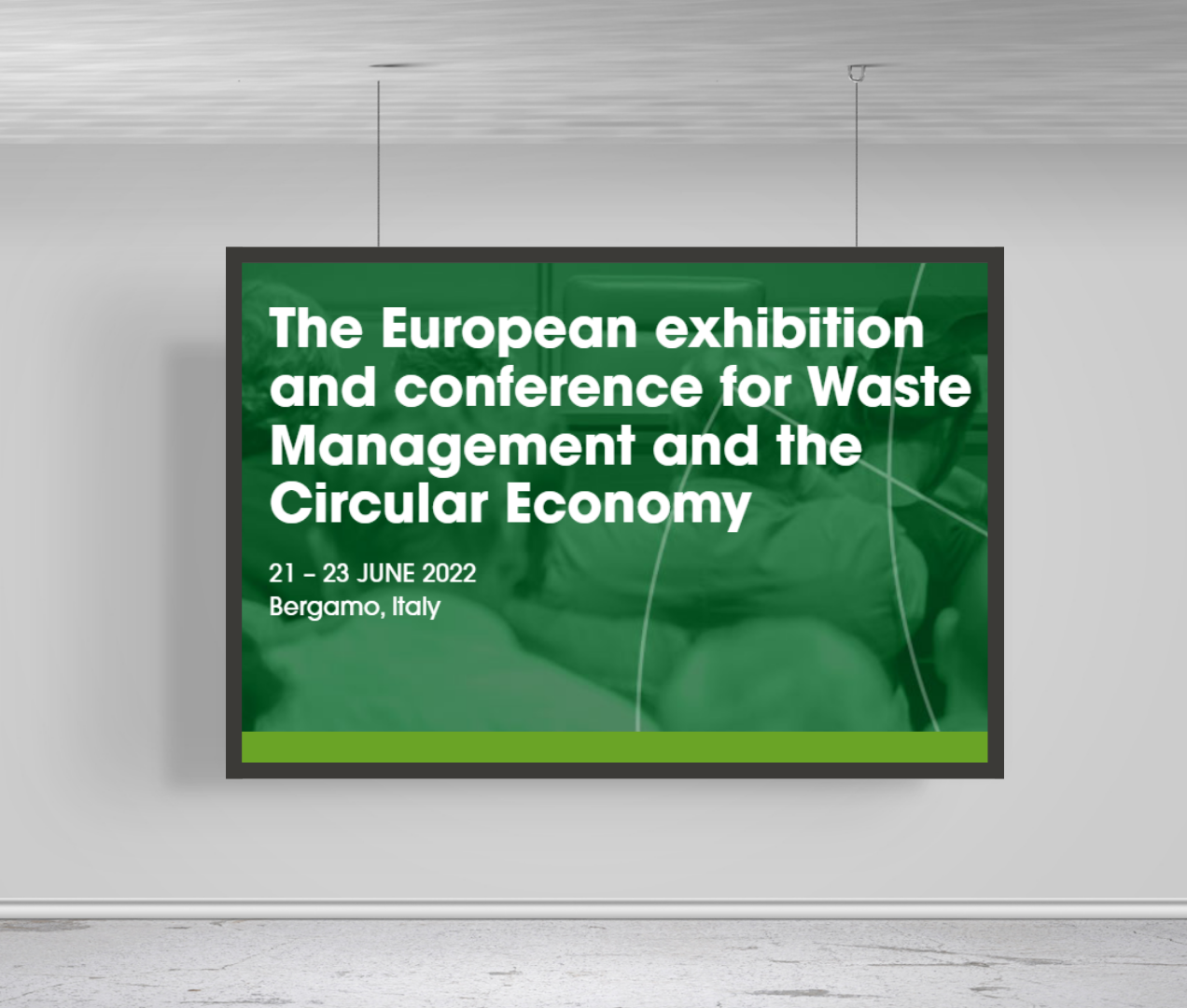
The European exhibition and conference for Waste Management and the Circular Economy
21-23 June 2022, Bergamo – ITALY
Waste Management Europe brings together the leading minds and the brightest innovators, to drive an agenda of change for the waste management industry. The conference is designed to bring the urgent topics of waste management into focus and promote innovation, collaboration and discovery for the industry. ![]()

3rd Symposium on Circular Economy and Sustainability: circulareconomy2050.eu
27-29 June 2022, Chania – GREECE
This Symposium provides is looking into Circular Economy and Sustainability applications under a holistic scale approach. A major innovation of this Symposium is the bridging of engineering, management and economic knowledge to support the effective advance of circular and sustainability principles. ![]()

The WaysTUP! project counts 26 partners, each expert in their field, collaborating to transform urban bio-waste into valuable end products.
Our experts will be more than happy to answer to your questions or provide more info on the project.
Project Coordinator: Belén Miranda, innova@sav-lavega.com

Subscribe to our newsletter: